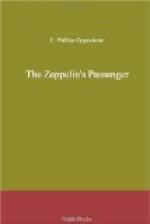disposition, and yet, during the last few days, he
had convinced himself that she was beginning to care.
Her strained relations with her husband had been,
without a doubt, her first incentive towards the acceptance
of his proffered devotion. Now he told himself
with eager hopefulness that some portion of it, however
minute, must be for his own sake. The relations
between husband and wife, he reminded himself, must,
at any rate, have been strained during the last few
months, or Cranston would never have been able to keep
his secret. In his gloomy passage through this
land of ill omens, however, he shivered a little as
he thought of the other possibility—tortured
himself with imagining what might happen during her
revulsion of feeling, if Philippa discovered the truth.
A sense of something greater than he had yet known
in life seemed to lift him into some lofty state of
aloofness, from which he could look down and despise
himself, the poor, tired plodder wearing the heavy
chains of duty. There was a life so much more
wonderful, just the other side of the clouds, a very
short distance away, a life of alluring and passionate
happiness. Should he ever find the courage,
he wondered, to escape from the treadmill and go in
search of it? Duty, for the last two years, had
taken him by the hand and led him along a pathway
of shame. He had never been a hypocrite about
the war. He was one of those who had acknowledged
from the first that Germany had set forth, with the
sword in her hand, on a war of conquest. His
own inherited martial spirit had vaguely approved;
he, too, in those earlier days, had felt the sunlight
upon his rapier. Later had come the enlightenment,
the turbulent waves of doubt, the nightmare of a nation’s
awakening conscience, mirrored in his own soul.
It was in a depression shared, perhaps, in a lesser
degree by millions of those whose ranks he had joined,
that he felt this passionate craving for escape into
a world which took count of other things.
CHAPTER XVII
Punctually at 12 o’clock the next morning, Lessingham
presented himself at the hotel in Dover Street and
was invited by the hall porter to take a seat in the
lounge. Philippa entered, a few minutes later,
her eyes and cheeks brilliant with the brisk exercise
she had been taking, her slim figure most becomingly
arrayed in grey cloth and chinchilla.
“I lost Helen in Harrod’s,” she
announced, “but I know she’s lunching
with friends, so it really doesn’t matter.
You’ll have to take care of me, Mr. Lessingham,
until the train goes, if you will.”
“For even longer than that, if you will,”
he murmured.
She laughed. “More pretty speeches?
I don’t think I’m equal to them before
luncheon.”
“This time I am literal,” he explained.
“I am coming back to Dreymarsh myself.”
He felt his heart beat quicker, a sudden joy possessed
him. Philippa’s expression was obviously
one of satisfaction.




